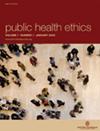恐惧的自由主义与公共卫生伦理
IF 2
3区 哲学
Q2 ETHICS
引用次数: 0
摘要
本文认为,恐惧自由主义在两个方面为公共卫生伦理提供了有用的理论框架。首先,它有助于调和公共卫生干预与自由主义政治之间的矛盾。其次,它强化了自由主义政治文化中现有的公共卫生干预理由。文章以 COVID-19 大流行中的政治情绪为背景对此进行了讨论。恐惧在大流行病政治经历中扮演着核心角色,这种恐惧延伸到了对大流行病后政府将使应急政治正常化并威胁自由民主政治文化的担忧。文章提出,恐惧的自由主义不仅为减轻这种恐惧提供了理论解决方案,而且还调和了自由主义政治与公共卫生干预之间长期存在的紧张关系。如果考虑到恐惧自由主义的政治现实主义特征,这一点尤为重要。文章就此提出了两个观点,并讨论了它们在强制疫苗接种中的实际意义。本文章由计算机程序翻译,如有差异,请以英文原文为准。
The Liberalism of Fear and Public Health Ethics
This article argues that the liberalism of fear provides a useful theoretical framework for public health ethics in two fronts. First, it helps reconcile the tension between public health interventions and liberal politics. Second, it reinforces the existing justifications for public health interventions in liberal political culture. The article discusses this in the context of political emotions in the COVID-19 pandemic. Fear plays a central role in the experiences of pandemic politics, and such fear is extended to the concern that post-pandemic government would normalize emergency politics and threaten the political culture of liberal democracy. The article proposes that the liberalism of fear provides a theoretical solution not only to alleviate such fear, but also to reconcile the long-established tension between liberal politics and public health intervention. This is particularly so if the liberalism of fear’s characteristic of political realism is taken into account. The article makes two points about this, and discusses their pragmatic implications in the case of compulsory vaccination.
求助全文
通过发布文献求助,成功后即可免费获取论文全文。
去求助
来源期刊

Public Health Ethics
PUBLIC, ENVIRONMENTAL & OCCUPATIONAL HEALTH-MEDICAL ETHICS
CiteScore
3.10
自引率
9.50%
发文量
28
审稿时长
>12 weeks
期刊介绍:
Public Health Ethics invites submission of papers on any topic that is relevant for ethical reflection about public health practice and theory. Our aim is to publish readable papers of high scientific quality which will stimulate debate and discussion about ethical issues relating to all aspects of public health. Our main criteria for grading manuscripts include originality and potential impact, quality of philosophical analysis, and relevance to debates in public health ethics and practice. Manuscripts are accepted for publication on the understanding that they have been submitted solely to Public Health Ethics and that they have not been previously published either in whole or in part. Authors may not submit papers that are under consideration for publication elsewhere, and, if an author decides to offer a submitted paper to another journal, the paper must be withdrawn from Public Health Ethics before the new submission is made.
The editorial office will make every effort to deal with submissions to the journal as quickly as possible. All papers will be acknowledged on receipt by email and will receive preliminary editorial review within 2 weeks. Papers of high interest will be sent out for external review. Authors will normally be notified of acceptance, rejection, or need for revision within 8 weeks of submission. Contributors will be provided with electronic access to their proof via email; corrections should be returned within 48 hours.
 求助内容:
求助内容: 应助结果提醒方式:
应助结果提醒方式:


